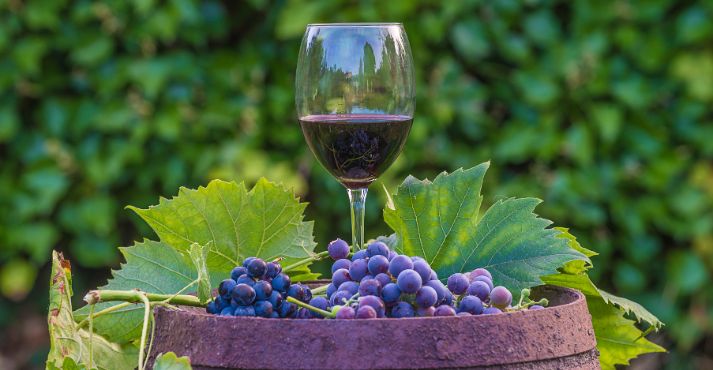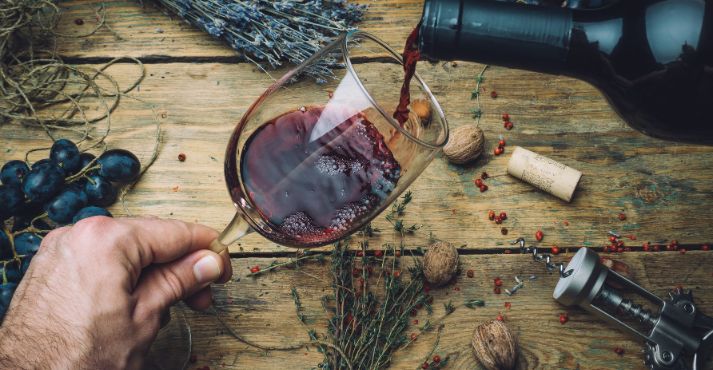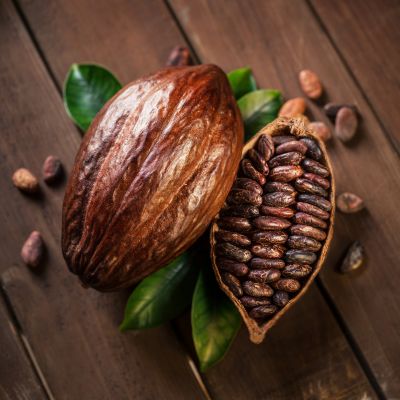Step into the fascinating world of biodynamic wine, where winemaking goes beyond the usual and enters a domain of unique connections with nature.
This guide will dig into the principles, practices, and significance that make biodynamic wine stand out.
Biodynamic winemaking is more than a process; it’s a philosophy deeply rooted in how vineyards and the cosmos interact.
Imagine a special connection where the patterns of the universe influence how vines grow, resulting in grapes that carry the unique qualities of their cosmic journey.
Let’s explore the world of biodynamic wine together, understanding the principles that guide it, looking into the cosmic influences on vineyards, and discovering the unique traits that make each sip a distinctive experience.
Understanding Biodynamic Winemaking

Biodynamic winemaking is more than just a method; it’s an organic and holistic philosophy that views the vineyard as a self-sustaining ecosystem.
Definition of Biodynamic Winemaking
At its core, biodynamic winemaking embraces an organic and holistic approach. It goes beyond traditional winemaking by treating the vineyard as a living entity interconnected with nature.
Principles of Biodynamics
Biodynamics incorporates unique principles such as lunar cycles, herbal preparations, and the idea that the vineyard is a living organism. These principles enhance the vineyard’s vitality and produce grapes reflecting the terroir.
Lunar Cycles
One distinctive aspect of biodynamics is its consideration of lunar cycles. Winemakers align vineyard activities with the moon’s phases, believing it influences soil moisture, sap flow, and plant growth.
Holistic Vineyard Ecosystem
In biodynamic winemaking, the vineyard is more than rows of grapevines. It’s seen as a holistic ecosystem where each element contributes to the health and balance of the entire environment.
Living Organism Concept in Biodynamics
The concept of the vineyard as a living organism emphasizes the interconnectedness of soil, plants, and animals. Biodynamic practices seek harmony in these relationships, fostering a sustainable and thriving ecosystem.
Biodynamic Certification and Standards
Achieving biodynamic certification involves a meticulous process that adheres to stringent standards set by organizations like Demeter.
Let’s delve into the significance of this certification in ensuring the authenticity and quality of biodynamic wines.
Biodynamic Certification Process
Biodynamic certification isn’t granted lightly. Winemakers undergo a comprehensive process that scrutinizes their adherence to biodynamic principles. This includes assessing practices related to lunar cycles, herbal preparations, and holistic vineyard management.
Demeter Standards for Wines
Demeter, a leading certification body, sets the standards for biodynamic agriculture, including winemaking. These standards cover everything from soil fertility to pest management, ensuring a holistic and sustainable wine production approach beyond traditional organic practices.
Ensuring Quality in Biodynamic Winemaking
Adherence to Demeter standards isn’t just a checkbox; it’s a commitment to quality. Biodynamic winemakers believe that their practices respect the environment and contribute to the wines’ unique character and flavor profile.
Authenticity Through Certification
The certification process is a vital aspect of maintaining authenticity. The Demeter label on a bottle signifies a wine crafted with a deep understanding of nature’s interconnectedness and a commitment to sustainable practices.
Quality Assurance for Consumers
For consumers, the Demeter certification provides assurance. It shows that the wine in their hands is more than just a product; it’s the outcome of a thorough winemaking process that respects the Earth’s natural cycles.
Sowing Sustainability: Biodynamic Vineyard Practices
Let’s explore the world of biodynamic vineyards, where winemakers embrace practices deeply connected to nature. These methods, focused on sustainability and holistic farming, shape the heart of biodynamic winemaking.
Lunar-Guided Planting and Harvesting
In biodynamic vineyards, winemakers use the moon’s phases to guide planting and harvesting. Following nature’s flow creates a unique link between the vines and the sky.
Embracing Compost and Cover Crops
No synthetic chemicals find their way into biodynamic vineyards. Instead, winemakers rely on compost and cover crops to feed the soil. These natural methods not only boost soil health but also encourage a variety of plants and creatures to thrive together.
A Natural Harmony Without Synthetic Chemicals
Biodynamic vineyards keep synthetic chemicals away. This commitment ensures that the grapes and the wine they produce genuinely capture the natural essence of the vineyard, giving a genuine taste of its unique character.
Holistic Sustainability in Action
Biodynamic vineyards showcase holistic sustainability. It’s not just about growing grapes; it’s about creating an entire system where the vines live peacefully with nature. This harmony supports the vineyard’s health and its wines’ outstanding quality.
Crafting Wines with a Natural Touch
Biodynamic practices go beyond rules; they’re a philosophy that sees the vineyard as a living entity, which in turn helps in the manufacturing of natural wines. Winemakers create wines that resonate with the Earth’s natural flow through moon-guided cycles, compost-rich soil, and a chemical-free space.
Cosmic Influences on Biodynamic Wines
Explore the fascinating connection between cosmic forces and biodynamic winemaking, where lunar and planetary cycles shape vineyard activities and grape development.
Understand the philosophy that aligning vineyard tasks with celestial cycles enhances the vitality and expression of the grapes.
Celestial Influence on Wines
In biodynamics, winemakers track the moon’s phases and planets’ movements. They time tasks like pruning and harvesting to match these cosmic patterns.
The aim is to leverage the impact of celestial forces on the vineyard and, consequently, the quality of the grapes.
Grape Development in Cosmic Alignment
The belief is rooted in the idea that coordinating vineyard activities with cosmic cycles can positively influence grape development.
Each moon phase and planetary position is thought to contribute uniquely to the vitality of the vines, resulting in grapes that carry a distinct cosmic imprint.
Capturing Cosmic Vitality
Aligning vineyard tasks with celestial cycles is seen as a way to enhance the overall health and vibrancy of the vines. This practice aims to capture the surrounding cosmic vitality, translating into wines that reflect the influence of the cosmos.
Celestial Influences
Picture the vineyard as a canvas where the moon and planets contribute to the grape-growing process.
Each cosmic cycle adds a nuanced note to the vineyard’s composition. Biodynamic winemakers consider themselves stewards of this cosmic dance, ensuring their wines resonate with celestial influences.
Biodynamic vs. Organic and Conventional Wines

Learn what makes biodynamic wines unique by comparing them to organic and regular wines. Understand the differences in how they’re grown, their sustainability, and the overall approach. Find out why more people are becoming interested in biodynamic wines.
Distinctive Farming Practices
- Biodynamic Wines: Adopt holistic farming by treating the vineyard as an autonomous system. Use the moon and cosmic patterns when planting, harvesting, and caring for the vineyard.
- Organic Wines: Avoid synthetic pesticides and chemicals in vineyard management, promoting natural and environmentally friendly practices.
- Conventional Wines: Typically follow traditional farming methods that may involve synthetic pesticides and fertilizers.
Sustainability at the Core
- Biodynamic Wines: Prioritize sustainability by adopting regenerative practices, viewing the vineyard as part of a larger ecosystem. Compost, cover crops, and biodiversity are integral components.
- Organic Wines: Strive for sustainability by avoiding synthetic chemicals, promoting soil health, and often implementing organic fertilizers.
- Conventional Wines: Practices may vary, but sustainability initiatives include water conservation and integrated pest management.
Philosophical Approaches
- Biodynamic Wines: Adopt a comprehensive and connected approach, bringing cosmic influences into farming. View the vineyard as a living organism.
- Organic Wines: Focus on natural and chemical-free approaches, promoting ecological balance in the vineyard.
- Conventional Wines Often adhere to more traditional and scientifically driven approaches to winemaking.
Growing Consumer Interest
- Biodynamic Wines: Witness a surge in popularity due to a perceived connection with nature, unique farming practices, and potential benefits in wine quality.
- Organic Wines: Attract consumers seeking wines produced with minimal environmental and human health impact.
- Conventional Wines Remain widely popular, with consumers who may prioritize consistency and tradition.
Perceived Benefits
- Biodynamic Wines: Advocates suggest enhanced grape quality, unique terroir expression, and a harmonious connection with nature.
- Organic Wines: Touted for lower environmental impact, potential health benefits, and the absence of synthetic additives.
- Conventional Wines: Often associated with consistent quality and familiar taste profiles.
Conclusion
Wrapping up our journey into the world of biodynamic wine, it’s clear that this winemaking approach is more than just a trend – it’s a holistic experience.
As we’ve explored the unique practices and the impact of cosmic influences on vineyards, the essence of biodynamic winemaking emerges.
The holistic nature of this approach, where every step is interconnected with nature’s rhythms, stands out. It’s not just about growing grapes; it’s about cultivating an ecosystem that harmonizes with the cosmos.
As we reflect on the insights gained, it’s evident that biodynamic wine is gaining popularity and shaping the future of winemaking.
The trend towards holistic practices and a deeper connection with the environment will likely grow, creating a space where the richness of cosmic influences continues to unfold.
So, here’s to the future of biodynamic winemaking, where each sip tells a story of harmony, uniqueness, and a journey through the cosmic dance of nature. Cheers to the evolving world of biodynamic wines!












